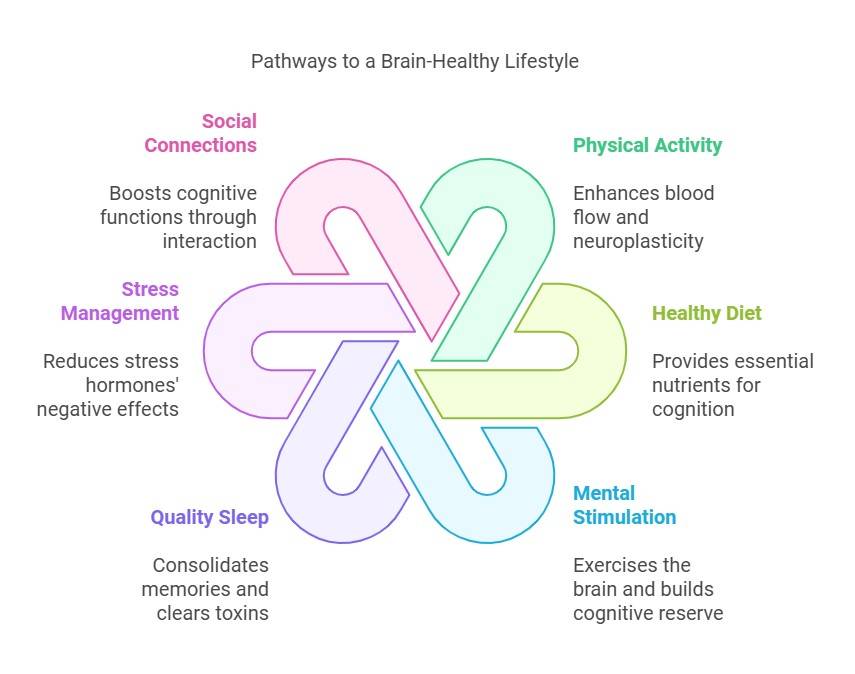Discover essential habits for a brain healthy lifestyle. Boost your cognitive wellness, enhance mental clarity, and optimize brain function. Elevate your mind today!
Introduction
The brain is a remarkable organ that oversees all facets of our existence. As we age, it’s natural for our mental function to change, but cognitive decline isn’t inevitable. By adopting a brain healthy lifestyle, we can maintain and even improve our brain function. Let’s explore various cognitive wellness habits that can help us keep our minds sharp and vibrant.
Essential Habits for Brain Healthy Lifestyle

The Power of Physical Activity
One of the most effective ways to boost brain health is through regular exercise. Exercise benefits not only your body, but it’s also vital for maintaining brain health.
When we engage in brain-optimizing behaviours like exercise, we increase blood flow to the brain, stimulate the release of growth factors, and promote neuroplasticity – the brain’s ability to form new connections.
I’ve personally noticed that after a workout, my mind feels clearer and more focused. This isn’t just a coincidence.
Research shows that exercise can reduce the risk of cognitive decline and improve memory and cognitive performance.
Here are some ways to incorporate physical activity into your mental fitness regimen:
- Aim to complete at least 150 minutes of moderate-intensity aerobic exercise every week.
- Try activities like jogging, swimming, or cycling
- Include strength training exercises to build muscle and boost brain health
- Practice yoga to combine physical activity with mindfulness
Keep in mind, that you don’t have to be an athlete to enjoy the advantages. Even a daily 30-minute walk can make a significant difference to your neurological health.
Nourishing Your Brain with a Healthy Diet

Our diet significantly influences our brain health. A brain-healthy diet provides the necessary nutrients for optimal cognitive function.
The Mediterranean diet, Nordic diet, and MIND diet are all known for their brain-boosting properties. These diets emphasize:
- Oily fish are high in omega-3 fatty acids, such as salmon and trout.
- Berries, especially blueberries, which are packed with antioxidants
- Leafy greens, like spinach and kale, are rich in vital vitamins and minerals.
- Nuts and seeds, rich in vitamin E and beneficial fats
- Whole grains for a steady energy supply to the brain
I’ve found that incorporating these brain-healthy foods into my diet has improved my mental clarity and focus.
It’s important to limit processed foods, excessive sugar, and unhealthy fats, as these can lead to inflammation and oxidative stress, which are detrimental to brain health.
Engaging in Mental Stimulation
It’s essential to keep your brain stimulated and involved to support cognitive health. Engaging in mental activities exercises your brain, enhances neural connections, and builds cognitive reserve, which may help postpone cognitive decline.
Here are some brain-boosting activities to try:
- Explore a wide range of subjects by reading books to broaden your knowledge.
- Solving puzzles like crosswords or Sudoku
- Learn a new language or skill
- Play strategy games or chess
- Take up a musical instrument
I recently started learning Spanish using a language app, and I’ve noticed improvements in my memory and problem-solving skills.
These cognitive vitality practices not only keep your brain sharp but also add enjoyment to your daily routine.
The Importance of Quality Sleep
Sleep is not just rest for the body; it’s essential for brain health and cognitive function. While we sleep, our brain consolidates memories, heals cells, and clears out toxins. Lack of sleep can impair cognitive abilities, focus, and memory retention. To improve your sleep quality:
- Maintain a regular sleep routine, including weekends
- Design a sleep-friendly atmosphere that is cool, dark, and muted
- Steer clear of screens before bed, as blue light can disrupt sleep quality
- Practice relaxation techniques like reading or deep breathing before bed
I’ve found that prioritizing sleep has significantly improved my mental acuity and overall well-being.
Managing Stress for Better Brain Health
Persistent stress can negatively affect brain health and cognitive performance. Extended exposure to stress hormones can cause brain regions to shrink and negatively affect memory and learning capacities.
Incorporating stress management techniques into your daily routine is crucial for maintaining cerebral well-being. Try these methods:
- Practice meditation or mindfulness
- Engage in deep breathing exercises
- Spend time in nature
- Try yoga or tai chi
- Journal your thoughts and feelings
I’ve personally found that a daily 10-minute meditation practice has helped reduce my stress levels and improve my focus.
The Power of Social Connections
Social interactions play a vital role in maintaining cognitive wellness. Participating in meaningful social interactions activates the brain, boosts cognitive functions, and lowers the risk of cognitive deterioration. Here are ways to stay socially active:
- Schedule regular catchups with friends and family
- Join clubs, or groups aligned with your interests
- Volunteer in your community
- Participate in group fitness classes or sports teams
I joined a book club last year, and it’s great for keeping me socially engaged while also encouraging me to read more.
Limiting Harmful Habits
Certain habits can negatively affect brain health. It’s important to:
- No alcohol consumption
- Quit smoking or avoiding tobacco in all forms
- Reduce intake of processed and sugary foods
I’ve cut back on my sugar intake, and I’ve noticed improvements in my energy levels and ability to concentrate.
Embracing Lifelong Learning
Learning new things helps keep our brains young and agile. It’s never too late to start! Here are some ideas to incorporate intellect-enhancing lifestyle choices:
- Enroll in courses at a nearby community center or opt for online classes.
- Participating in lectures or workshops on subjects that captivate you.
- Start a new hobby or craft
- Explore new destinations and engage deeply with diverse cultures.
I recently started learning photography, and it’s been exciting to challenge myself in a new way while also exercising my creativity.
Protecting Your Head
Moderate to severe headaches, even without diagnosed concussions, can increase the risk of cognitive impairment. To protect your brain:
- Wear appropriate protective gear during sports activities
- Use seatbelts when driving or riding in vehicles
- Make your home fall-proof, especially if you’re at risk of falls
Regular Health Check-ups
Regular check-ups with your healthcare provider can help catch and address health issues early, including those that I think will affect your brain health. Don’t hesitate to discuss any concerns about your cognitive function with your doctor.
Staying Hydrated
Proper hydration is crucial for optimal brain function. Even mild dehydration can affect cognitive performance. I strive to stay well-hydrated by drinking ample water all day long. I keep a water bottle with me as a reminder to stay hydrated.
FAQs about Brain Healthy Lifestyle
How do you make your brain healthier?
To make your brain healthier:
- Exercise regularly
- Eat a balanced diet rich in brain-boosting foods
- Get enough sleep (7-9 hours per night)
- Stay mentally active with puzzles, reading, and learning new skills
- Manage stress through relaxation techniques
- Stay socially connected
- Stay hydrated
- Limit alcohol and avoid smoking
- Get regular health check-ups
What are the four essential requirements for the brain to sustain optimal health?
The 4 fundamental needs of the brain to maintain health are:
- Oxygen: Through regular exercise and proper breathing
- Nutrients: From a balanced, brain-healthy diet
- Rest: Through quality sleep and relaxation
- Stimulation: From mental and social activities
What are 5 brain healthy foods?
Five brain-healthy foods are:
- Blueberries: Rich in antioxidants
- Salmon: High in omega-3 fatty acids
- Nuts (especially walnuts): Contain healthy fats and antioxidants
- Leafy green vegetables (like spinach): Packed with nutrients
- Whole grains: Provide steady energy for the brain
What is the best drink for your brain?
While water is essential for overall brain function, some of the best drinks for brain health include:
- Green tea: Contains caffeine and L-theanine for focus and relaxation
- Coffee: Rich in antioxidants and may improve memory
- Berry smoothies: Packed with antioxidants and nutrients
- Turmeric latte: Contains curcumin, which has anti-inflammatory properties
- Kombucha: Provides probiotics that may support brain health through the gut-brain connection
Remember, moderation is key, and water should still be your primary source of hydration.
Conclusion
Adopting a brain healthy lifestyle is a journey that requires consistent effort, but the rewards are immeasurable.
By incorporating these neuro-nurturing practices into your daily routine, you can support your brain health and enjoy better thinking, memory, and overall cognitive function.
Keep in mind, that it’s always the right time to begin prioritizing your brain health. Every small step counts towards better brain health and a more fulfilling life.
Whether it’s adding more vegetables to your diet, taking a daily walk, or challenging yourself with a new hobby, these cognitive wellness tips can help you maintain a sharp and vibrant mind for years to come.
By embracing these brain health habits and committing to an intellect-enhancing lifestyle, you’re not just improving your cognitive function today – you’re investing in your future mental well-being.
So why wait? Embark on your quest for improved brain health now!

Adel Galal is a health and wellness writer with over 30 years of experience studying and writing about health, fitness, nutrition, and healthy living. He is the founder of NextFitLife.com, where he shares practical, evidence-based guidance to support long-term health at any age. Adel’s mission is simple:
to help people make smarter health choices that fit real life, at any age.



